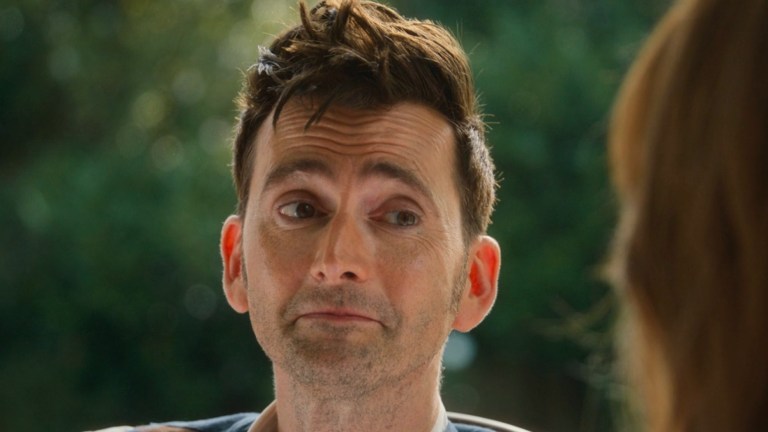Can Doctor Who Ever Really Give the Doctor a Happy Ending?
It goes against everything the Doctor is.

This Doctor Who article contains spoilers.
Should David Tennant die? That is a far more controversial question this week than it was last week. Last Saturday, Doctor Who viewers, who have few certainties to rely on at the best of times, sat down with the unshakeable confidence that, one way or another, they were going to watch Tennant’s take on the Doctor meet a tragic end, again.
Yes, if forced to guess, we would have bet that his ending would be a bit more uplifting than he saw at the end of his last run (“The Doctor doesn’t want to die and thinks that the next version of him is an imposter” is apparently a legacy Davies only likes to leave for other showrunners to pick up). But none of us could have foreseen the regeneration splitting the Doctor in two, like a bacterium, or Captain Kirk when the transporter is having an off day.
“Bigeneration” is a plot choice that has drawn mixed reactions – especially as Russell T Davies has gone on to say that this process has affected all the Doctors, leaving Tom Baker lying on the floor underneath Jodrell Bank while Sylvester McCoy is banging on the inside of his drawer at the morgue. One must imagine Patrick Troughton’s Doctor has pretty mixed feelings about surviving the Time Lord’s enforced regeneration only to discover himself floating in the vacuum of space surrounded by a bunch of dead Cyber Time Lords.
This also leaves us with the frightening prospect of not one, but potentially four David Tennant Doctors wandering around the Whoniverse (The Tenth Doctor, the meta-crisis Doctor, the post-meta-crisis regeneration Tenth Doctor, and the Fourteenth Doctor, for those keeping score at home).
But aside from all the fun to be had watching Doctor Who canon completely explode, again, bigeneration is a game changer, and it doesn’t necessarily change the game for the better. A key part of the Doctor Who mythos is that the Doctor dies. It is important thematically to the show – as Peter Capaldi himself has pointed out.
As Capaldi puts it, “People always ask me what is it about the show that appeals so broadly. The answer I would like to give that I’m discouraged from giving because it’s not useful to the promotion of a brand is that it’s about death, and it has a very, very powerful death motif in it which is that the central character dies.”
Happily Ever After?
There’s no denying the truth of Capaldi’s argument – and Russell T Davies himself made sure to have lots and lots of character deaths in his Doctor Who from the start. But Doctor Who is also a kid’s show (yes it is), and while we all know children’s stories can go to surprisingly dark places, you have to come out the other side eventually. Kids want a happy ending, and that is a difficult ask for a story that has been running continuously across various media for 60 years and looks set to keep going for at least 60 more.
This was a big part of the Fourteenth Doctor’s arc, as the Fifteenth Doctor points out by reeling off all the adventures, tragedies, bereavements, and struggles the Doctor has been through since Ian and Barbara wandered into his TARDIS back in the first episode. Anyone who actually lived through all that would be an emotional wreck.
But whatever happens, the Doctor always resets to zero, the figurative “Mad man (person) in a box”, which means giving them any kind of lasting closure is a tough job. Yet, that is what bigeneration gives the Fourteenth Doctor. Weirdly, his ending is most reminiscent of the end of a The Fast and the Furious movie – a found family of characters sitting around an outdoor table for a celebratory meal, the one character whose actor has passed away ostensibly just off-screen.
The Fourteenth Doctor gets everything the Doctor might want – a chance for quiet, for rest, a family, a home, and a spare TARDIS waiting in the wings if he wants to pop out for a Big Finish box set (or future TV special) when nobody’s looking. It is the happiest ending the Doctor could hope for, and not for the first time.
The Many Endings of the Doctor
In many ways, the Fourteenth Doctor’s ending is a shinier version of the Tenth’s the last time the Doctor and Donna travelled together. In the epic two-part franchise-sized crossover story, “The Stolen Earth”/”Journey’s End,” the Doctor is forced to regenerate, but instead of changing his face the regeneration energy is transferred into the Doctor’s own dismembered hand (it’s a long story) and Donna herself, creating the DoctorDonna (leading to her mindwipe ending) and a new, one-hearted Tenth Doctor clone that his previous companion, Rose, could take back to her universe to grow old with.
The original script even had Davies give the Doctor clone a bit of TARDIS coral to grow his own TARDIS later down the line. But even here, the Doctor clone is all angry and warlike, while the original Doctor is left looking sad and wet and alone in his TARDIS when the credits roll.
Other writers have also taken on the job of trying to give the Doctor a happy ending.
Paul Cornell, the writer of classic NuWho episodes “Father’s Day” and the “Human Nature/Family of Blood” two-parter, also wrote a piece of fan fiction all the way back in 2009, “The Last Doctor” that attempted to give him an ending. Appropriately, it is a Christmas story, which sees a final incarnation of the Doctor warming a community of refugees with the heat of a dying TARDIS at the end of the universe. Either through parallel evolution or, frankly, because Moffat probably read it, the Matt Smith regeneration story “The Time of the Doctor” bears more than a passing similarity to it.
In “The Last Doctor”, the Doctor doesn’t get a happy ending as such. This Doctor’s best ending is to keep fighting against the dying of the universe until the last possible moment (as River Song says, nobody knows that everything must die better than the Doctor, but he’ll never accept it), and then to be present when the new universe is born. When your character’s defining trait is a need to fight injustice at any place or time in the universe, going down fighting might be the best happy ending they can hope for.
Steven Moffat has had a go as well. With his own anniversary special, he gifted the Doctor three happy endings. First, he gave the Doctor his home planet back. Secondly, he hid it in a pocket dimension so that the Doctor still had adventures to come and also didn’t need to deal with all those pain-in-the-arse Time Lords. But finally, he introduced the Curator, who closely resembled Tom Baker and suggested the Doctor might revisit some old faces in his future (You don’t say?!). This character was all but said to be a future incarnation of the Doctor, a Doctor who had retired from saving the universe to look after an art gallery. Fans are already suggesting this is the Fourteenth Doctor’s post-bigeneration fate.
But this is not even the first future Doctor that Steven Moffat has introduced! In the story that gave us the Doctor’s non-linear love interest River Song, “Silence in the Library/The Forest of the Dead”, the child whose brain runs the Library supercomputer is cared for by an AI called “Doctor Moon”, played by Colin Salmon.
Moffat envisioned the “last scene of Doctor Who” while creating that two-parter, deciding that the River we meet in those episodes is not only his wife but his widow. Moffat explained in Doctor Who Magazine (via Radio Times) that “Somewhere in the terrible future, on a battlefield, the 45th Doctor dies in her arms and makes her the same promise she once made him – it’s not over for you, you’ll see me again. So River buries her husband and off she goes to have lots of adventures with his younger selves and confuse the hell out of them.
“Until, of course, she ends up in the data core of the Library Planet, and realises she’ll never see him again. And then she starts to wonder why anyone would call a moon ‘Doctor.’ Ahhh…”
Later Moffat would write that even before the 45th Doctor and River Song ended up happily ever after in the Library computer, River Song and the Doctor had another happy ending. At the end of the Christmas special, “The Husbands of River Song”, Peter Capaldi’s Twelfth Doctor and River Song are given one last night together, before River must go and meet her “death” in “Silence in the Library” and complete their timey wimey bootstrap paradox.
But at the end of the episode, the Doctor reveals that on this planet one night lasts 24 years. For all the Fifteenth Doctor says about the Doctor never stopping, he stopped here for a while – as he did on the planet of Christmas in “The Time of the Doctor”, growing old and protecting children.
That is what all these endings have in common. The Doctor stops travelling. He stops, he settles down. The Ninth Doctor proudly proclaims, “I don’t do domestic”, but all of these “endings” imply a bit of domesticity is just what the Doctor is missing.
The End…Until It’s Not
While the Fifteenth Doctor can happily fly off into space because the Fourteenth Doctor “did the rehab”, and is next seen dancing in a nightclub in the upcoming “The Church on Ruby Road” Christmas special, we’ve got to ask, how long before this Doctor’s trauma meter is so filled up that they need to go and find another domestic happy ending somewhere?
Because the idea that the Doctor needs to “settle down” is, frankly, at odds with the entire nature of the character. The Russell T Davies version in particular is an escape from a certain preconceived notion of domesticity – frankly, straight domesticity. Rose, Donna, and Torchwood’s Gwen, they all start out trapped in dull lives with useless boyfriends, yearning for something more (Steven Moffat’s take on Who is, obviously, a good deal more sympathetic to useless boyfriends).
The Doctor is about freedom and adventure, and doing what’s right even when it’s dangerous or painful or socially awkward, and the happiest endings, the ones that leave you punching the air when the credits roll, are the ones where the TARDIS is already flying off to its next adventure as Ncuti Gatwa does at the end of “The Giggle”.
If one day Doctor Who does actually need an ending, an actual, proper, canon ending that brooks no return, the fact is they will have a hard time topping Sylvester McCoy’s speech at the end of “Survival”, the last story broadcast before the classic series of Who was unceremoniously cancelled:
“There are worlds out there where the sky is burning, and the sea’s asleep, and the rivers dream; people made of smoke and cities made of song. Somewhere there’s danger, somewhere there’s injustice, and somewhere else the tea’s getting cold. Come on, Ace. We’ve got work to do!”
Doctor Who returns to BBC One, BBC iPlayer, and Disney+ on Dec. 25 with “The Church on Ruby Road.”
